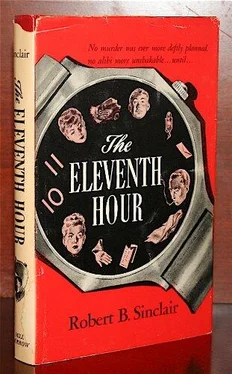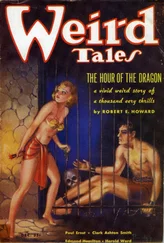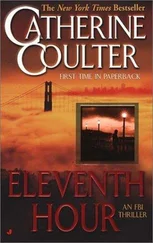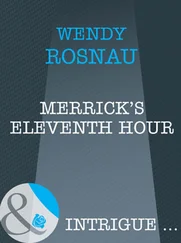Robert Sinclair - The Eleventh Hour
Здесь есть возможность читать онлайн «Robert Sinclair - The Eleventh Hour» весь текст электронной книги совершенно бесплатно (целиком полную версию без сокращений). В некоторых случаях можно слушать аудио, скачать через торрент в формате fb2 и присутствует краткое содержание. Город: New York, Год выпуска: 1951, Издательство: M.S. Mill Co. and W. Morrow, Жанр: Детектив, на английском языке. Описание произведения, (предисловие) а так же отзывы посетителей доступны на портале библиотеки ЛибКат.
- Название:The Eleventh Hour
- Автор:
- Издательство:M.S. Mill Co. and W. Morrow
- Жанр:
- Год:1951
- Город:New York
- ISBN:нет данных
- Рейтинг книги:3 / 5. Голосов: 1
-
Избранное:Добавить в избранное
- Отзывы:
-
Ваша оценка:
- 60
- 1
- 2
- 3
- 4
- 5
The Eleventh Hour: краткое содержание, описание и аннотация
Предлагаем к чтению аннотацию, описание, краткое содержание или предисловие (зависит от того, что написал сам автор книги «The Eleventh Hour»). Если вы не нашли необходимую информацию о книге — напишите в комментариях, мы постараемся отыскать её.
An abridged version of this novel has appeared in
Oct 1950 under the title “Design for Death”
The Eleventh Hour — читать онлайн бесплатно полную книгу (весь текст) целиком
Ниже представлен текст книги, разбитый по страницам. Система сохранения места последней прочитанной страницы, позволяет с удобством читать онлайн бесплатно книгу «The Eleventh Hour», без необходимости каждый раз заново искать на чём Вы остановились. Поставьте закладку, и сможете в любой момент перейти на страницу, на которой закончили чтение.
Интервал:
Закладка:
He blew smoke at the ceiling and again scanned the headlines. The trouble with most of the crime news in Los Angeles, he had long since concluded, was that it was too bizarre for fiction. Or else, by repetition, it had become commonplace. There were no new angles; crime was in a rut.
And then, suddenly, out of the blue, it came to him. He riffled through the paper, found the story, and reread it. What had happened was so simple it was almost ludicrous.
Mr. and Mrs. George J. Yates had gone shopping the preceding Friday night at the neighborhood Supermarket. Mr. Yates had gone in to do the marketing for the week-end — Mrs. Yates not, apparently, being the domestic type — leaving her in the car in the parking lot. When he returned, some twenty minutes later, the car was not there, nor was Mrs. Yates. He had trudged home, only to find that his wife was not there either, and the following morning he had reported her disappearance to the police. As three days passed with no news of her, Mr. Yates’ concern turned to worry, to terror, to dread of the horrible fate which had probably overtaken Mrs. Yates. But he was not prepared to be so humiliated by the preposterous truth.
Mrs. Yates, it now appeared, had been sitting in the car waiting when Alvin Canmer, aged 16 and a junior at West Side High School, happened to pass the car. Alvin was on his way home from his part-time job in the hardware store, where he had waited on Mrs. Yates once or twice. He said “Good evening” to her, and a conversation ensued, the details of which, unfortunately, were not recorded. But Mrs. Yates was beginning to be bored with waiting for Mr. Yates, and also, it seems, she had been bored with Mr. Yates himself for some time. At any rate, the dialogue had apparently got down to the facts of life in near-record time, with the result that Alvin got into the car and drove to the nearest motel. There they paid a night’s rent in advance, parked the car outside their bungalow, and retired — for three days. Alvin had occasionally sallied forth for food.
But when, after three days, they had attempted to slip out without paying the balance of the bill, they had been apprehended by the motel proprietor. Finding both of them insolvent, he had called the police, who, on checking the registration of the car, learned somewhat to their surprise that they had recovered the missing Mrs. Yates, who was duly returned, temporarily, to her outraged and reluctant husband.
Along with a million other readers that morning, Conway chuckled inwardly at the story. But it was not the story itself which interested him: it was the timing of the disappearance — the suddenness, the rapidity, the unpredictability of the whole thing.
He turned to the account of the murder of the waitress.
He could sympathize with the bafflement of the police on this one. Gladys Ford, 89, divorced, had left the restaurant where she was employed at ten o’clock Saturday night. She had not, so far as could be ascertained, been seen alive again. Her parents, with whom she lived, had reported her disappearance. As in the case of Mrs. Yates, nothing had come of that, either.
Monday afternoon the patrolmen in a radio car cruising on a quiet residential street had noticed a parked car with a license number which seemed vaguely familiar. Checking, they discovered it to be on their stolen car list. Checking further, they found on the floor, covered by a blanket, the body of Gladys Ford. A resident of the neighborhood was sure the car was there before eleven o’clock Saturday night — which was no more than an hour after the unfortunate victim had left the restaurant. She had been strangled with her own belt.
The headline, “Slain by Sex Fiend,” Conway decided, might have been due to the fact that the pattern of the case somewhat resembled other sex murders of the past few months. Or it might have been that editors know that the addition of the word “Sex” lends a piquancy which is lacking in a murder performed by a run-of-the-mill maniac.
But the important thing was that tragedy, as well as romance, could strike with such complete unpredictability. And merely because of its fantastic suddenness — and senselessness — leave no trace. In that was the idea for a story, and Conway believed that he could write it.
He worked straight through until almost six o’clock, and when he stopped, weary and hungry, he felt better than he had in months. He wanted to get out of the house; he was sure Helen had no intention of getting dinner, and he hoped that he might avoid a meeting with her. He listened at the door and could hear nothing; he assumed she had followed her usual practice after one of these quarrels of going out to a movie, having dinner somewhere, and going to another movie in the evening.
He went downstairs cautiously, but all was clear, and the car was still in the garage. He was grateful that Helen was too uneasy about her driving to want to cope with Los Angeles traffic if she could avoid it.
He had a quick dinner in a neighborhood restaurant and decided to find out how practical was the scheme he had worked out for his story. What he had in mind was a “perfect murder” plot, with the police themselves providing the killer’s alibi. That, in turn, was dependent on the unexpectedness of the crime, and on exact timing.
For two hours he drove about, checking times and distances, even selecting streets and routes, to prove to himself that his scheme was valid. It was more than that, it seemed perfect; he could find no flaws in it at all. He drove home in a cheerful frame of mind.
For the next two days Conway worked steadily and contentedly. He saw Helen only at lunch, and open hostilities were avoided by the fact that neither spoke a word. He became more and more optimistic over the possibilities of the story; it might even make a picture, and a movie sale would solve all his problems. By midnight of the second day he estimated he was about halfway through.
Helen came downstairs while he was having breakfast the next morning. “You’ve been giving that typewriter quite a beating,” she said.
“It’s coming along pretty well.” He realized, suddenly, that these were the first words he had spoken to anyone in three days. The added realization came that he had not missed the sound of his own voice nor of anyone else’s — especially Helen’s.
“Just let me know if you need any paper, carbons, pencils, or erasers. The noise of that typewriter is music to me, and I’d hate to have it interrupted — it might be a long time before the inspiration returned.”
The knowledge that he was working had always mollified her; apparently it still did.
“I’d better tell you that you won’t be hearing any music this morning — or maybe even this afternoon.”
“I might have expected that.”
“I have to figure out the finish before I do any more writing. I got hot about this idea and wanted to get what I had down on paper. Now I have to stop and think out the rest.” He saw the sardonic look come into her eyes, but she said nothing. He finished his breakfast as quickly as he could and went to his room.
He read over what he had written, made a few changes, and then settled down to plot out the rest of the story. He had created a murderer who had done that so-called impossible thing: committed the “perfect crime.” His problem now was to create another character who was just a little brighter than the killer: who could smell out the murder and prove that the “perfect crime” was impossible. He rejected the easy solutions which came to him; he refused to settle for the chance coincidence, the lucky guess or the unlucky slip which might — and usually does — expose the criminal. Conway had written a murderer who knew himself and his limitations, who had planned a crime he could get away with, and cast himself in a part he could play. He had to be caught, not because he did the wrong things, but because he did the right things.
Читать дальшеИнтервал:
Закладка:
Похожие книги на «The Eleventh Hour»
Представляем Вашему вниманию похожие книги на «The Eleventh Hour» списком для выбора. Мы отобрали схожую по названию и смыслу литературу в надежде предоставить читателям больше вариантов отыскать новые, интересные, ещё непрочитанные произведения.
Обсуждение, отзывы о книге «The Eleventh Hour» и просто собственные мнения читателей. Оставьте ваши комментарии, напишите, что Вы думаете о произведении, его смысле или главных героях. Укажите что конкретно понравилось, а что нет, и почему Вы так считаете.












